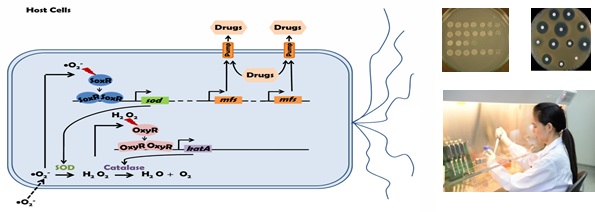Pathogenic bacteria

1. Human Pathogens
Nosocomial infection is an important problem for long-term hospital patients that results in high mortality rates. These infections are generally caused by opportunistic bacteria that are resistant to multiple drugs and are therefore often difficult to cure. In order to discover novel antimicrobial agents for nosocomial infection, the mechanisms of drug resistance are being intensively studied in our laboratory using genetic engineering techniques. There are two opportunistic bacteria that we are currently using as models in this study, which are Pseudomonas aeruginosa and Stenotrophomonas maltophilia. The research is also focused on the study of bacterial pathogenesis. In order to infect a human, bacteria have to overcome host immune responses. Macrophages and neutrophils are the key players in the host innate immune response to bacterial infection. These cells generate reactive oxygen and nitrogen species in order to kill invading bacteria. Understanding bacterial defense mechanisms against these host responses will provide useful insights that can lead to the development of more effective drugs for the treatment of infections caused by these bacteria. Thus, the knowledge gained from the research has the potential to improve the health of people both here in Thailand and worldwide.
2. Plant Pathogens
Thailand is an agricultural country, in which 80% of total exports constitute agricultural products. In order improve the economic health of Thai people, technical developments that could benefit the agricultural industry should be focused on.
Research at the Laboratory of Biotechnology dealing with plant pathogens mainly focuses on the virulence mechanisms of two important plant pathogens; Xanthomonas spp. and Agrobacterium tumefaciens. These plant pathogens can cause diseases in many economically important plants, including rice, cabbages, and tobacco. During plant pathogen interaction, the main substances that plants produce to kill pathogens are reactive oxygen species. To aid in the establishment of successful infections, plant pathogens have evolved defense mechanisms such as the production of antioxidative enzymes. Our research aims to acquire a better understanding of each defense mechanism and also their regulators. The knowledge gained from the study of these mechanisms could provide important information for identifying antimicrobial targets that can be used to identify more effective antimicrobial agents for use in agricultural applications that would lead to increased production yield of agricultural products.


